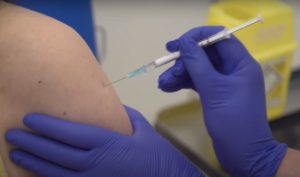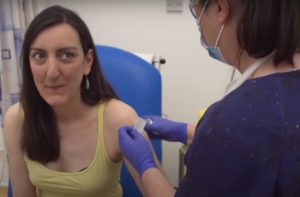Following an external audit, the NIHR Oxford Biomedical Research Centre (BRC) has again been successfully certified to the internationally recognised ISO 9001:2015 standard. Oxford is the only NIHR BRC in the country to have designated ISO 9001 ... READ MORE
Serum iron may be useful biomarker to identify COVID-19 disease severity
A new study led by University of Oxford researchers has found that patients with severe COVID-19 respiratory failure have very low levels of iron, compared to those with less severe disease. Changes in iron levels have been associated with worsening disease for other viral infections such ... READ MORE
Study explores effects of COVID-19 on sleep
Oxford researchers have launched a study investigating the impact of the COVID-19 pandemic on sleep and daily rhythms in adults. The UK arm of the International COVID-19 Sleep Study (ICOSS) is led by Professor Colin Espie from the Nuffield Department of Clinical Neurosciences at the University ... READ MORE
Oxford leads part of major COVID-19 drugs trial
As part of a new UK trial researchers at the University of Oxford will investigate whether administering the anti-inflammatory drug infliximab to patients with COVID-19 can prevent progression to respiratory failure or death. The multi-arm, multi-stage CATALYST Trial, is being led by the ... READ MORE
Oxford BRC researchers present findings as STARBIOS2 ends
Oxford BRC-funded researchers have presented important new findings in the field of gender equity and women in Biomedical Research Centres at the final event of the international STARBIOS2 project. Started in 2016, STARBIOS2 (Structural Transformation to Attain Responsible BIOSciences) is a ... READ MORE
First patient recruited for key drug treatment trial
A clinical trial to test whether Azithromycin, a commonly used antibiotic, can treat the symptoms of COVID-19 in outpatients has recruited its first patient. The ATOMIC2 trial, which is being led from Oxford, will enrol 800 people who are being assessed at hospital with COVID-19 but felt well ... READ MORE
Drug trial could lead to enhanced respiratory care for COVID-19 patients
Researchers at the University of Oxford are working with clinical collaborators from NHS hospitals, including Oxford University Hospitals, to test a drug that could raise oxygen levels in the blood in COVID-19 patients in order to improve their chances of recovery. Raising oxygen levels is ... READ MORE
Study sheds light on breast cancer risk after pre-invasive disease
Women who are diagnosed with ductal carcinoma in situ (known as DCIS) during breast screening go on to experience higher risks of developing breast cancer and of death from breast cancer, compared with the general population, according to a study by Oxford researchers. DCIS is a disease where ... READ MORE
Oxford COVID-19 vaccine to begin phase II/III human trials
University of Oxford researchers have begun recruiting for the next phase in human trials of a COVID-19 vaccine in human volunteers. The phase I trial in healthy adult volunteers began in April. More than 1,000 immunisations have been completed and follow-up is currently ongoing. The next ... READ MORE
BRC researchers complete Next Generation Leaders Programme
Researchers supported by the NIHR Oxford Biomedical Research Centre have successfully completed the Next Generation Leaders Programme, a new initiative that was commissioned and designed by the BRC to enable early and mid-career researchers and health professionals to develop key skills in ... READ MORE
Social disconnection worsens mental health after a loss
Keeping grief hidden can be a survival strategy after suffering a bereavement. However new research shows that the social disconnection caused by concealing feelings of loss can increase psychological distress. After bereavement people can feel afraid of opening up about their grief to others. ... READ MORE
BRC Technology Co-theme Lead appointed as NIHR Health Technology Assessment Programme Director
Professor Andrew Farmer, the Oxford Biomedical Research Centre’s Co-theme Lead for Technology and Digital Health and an experienced general practitioner, begins a new role with the NIHR on 1 June 2020 as Health Technology Assessment (HTA) Programme Director. He will take over from Professor Hywel ... READ MORE
BRC theme lead to study ‘remote-by-default’ care in COVID-19 pandemic
A senior Oxford BRC investigator has received major government funding for a new study to support general practitioners to deliver effective remote care to their patients during the COVID-19 pandemic. Professor Trisha Greenhalgh (pictured right), of the University of Oxford’s Nuffield ... READ MORE
BRC Senior Research Fellows take part in masterclass on ‘leading change’
The Oxford Biomedical Research Centre’s Senior Research Fellows have taken part in a leadership masterclass led by Professor Sue Dopson, Rhodes Trust Professor of Organisational Behaviour and Deputy Dean of the Saïd Business School. The aim of the BRC’s Senior Research Fellowships is to support ... READ MORE
Managing clinical trials in a pandemic: interview with Prof Duncan Richards
Professor Duncan Richards, who is Director of the Oxford Clinical Trials Research Unit (OCTRU) as well as the NIHR Oxford Biomedical Research Centre’s Musculoskeletal Co-theme Lead, is at the forefront of Oxford’s strategy on clinical trials for COVID-19. In this interview with the Nuffield ... READ MORE
BRC cancer lead elected Royal Society Fellow
The NIHR Oxford BRC’s Theme Lead for Cancer, Professor Xin Lu, has been elected as a Fellow of the Royal Society, in recognition of her contribution to cancer biology. As well as her role with the Oxford BRC, Xin Lu is Director of the Ludwig Institute for Cancer Research, Oxford Branch in the ... READ MORE
Oxford-based citizen science project reaches three million classifications in fight against antibiotic resistance
The Bash the Bug citizen science project has achieved three million classifications, after seeing a rapid increase in participation over the last two months. Hosted on the Zooniverse platform, Bash the Bug has over 20,000 volunteers worldwide helping researchers to understand and predict which ... READ MORE
Oxford COVID-19 vaccine begins human trial stage
University of Oxford researchers have begun testing a COVID-19 vaccine in human volunteers in Oxford. Around 1,110 people will take part in the trial, half receiving the vaccine and the other half (the control group) receiving a widely available meningitis vaccine. Of the first two ... READ MORE
Large-scale COVID-19 infection and antibody test study launched
Some 20,000 households across England are being contacted to take part in the first wave of a major new government study to track the COVID-19 coronavirus in the general population. The study will help improve understanding around the current rate of infection and how many people are likely to ... READ MORE
Childhood obesity increases the risk of fracture new study finds
Overweight or obese pre-school children have a higher risk of bone fractures during childhood than those of normal range weight according to a new study published in the Journal of Bone & Mineral Research and supported by the NIHR Oxford Biomedical Research Centre. The increasing prevalence ... READ MORE
- « Previous Page
- 1
- …
- 21
- 22
- 23
- 24
- 25
- …
- 48
- Next Page »

















